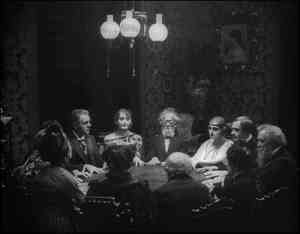Creative Aging Poems Fare for “Last Sunday”; Spiritualism as an Escape from Expected Norms
Sunday, for the Memorial Day Holiday Weekend, brought something new to the Bloomington Writers Guild’s normal “Last Sunday Poetry Reading.” This one, also the last for the season as the Guild goes on its summer haitus, combined with a local Creative Aging Festival in conjunction with National Older Americans Month (so many things, so many goings on!), brought numerous guests for what amounted to an all-open mike session. Most poets were also, therefore, on the elderly side themselves, though many of us in the Writers Guild seem to be so anyway. But as for another difference from expected practice, even though I was invited to, I begged off from reading a poem myself on the grounds that I — who do not age creatively — didn’t have anything that seemed appropriate.
But what of “after-aging,” one might ask? Poems on death, as on creatures undead, might not have been proper, but what should greet me afterward when I stopped by the library on the way home to look at email (their equipment being faster than the cave computer) but, via DIRGEMAG.COM, “The Victorian Séance: The Ultimate Feminist Death Party” by Patricia Lundy. The gist is that  spiritualism offered an opportunity for women in a strictly defined male-dominated society to find a niche where they, themselves, were a center of power, however limited. But spiritualism had become quite popular among men as well as women so, even if specialized, an ambitious practitioner could escape at least for a time her expected role. As a medium conducting a séance, a woman had more status and opportunity than she did anywhere else in society. Victorian society demanded that a woman satisfied her husband sexually whenever he wished, had no property or voting rights, and did not have the power to divorce her husband or even gain custody of her children if he divorced her. Spiritualism offered her a way to fight the patriarchy — by communicating with the dead. Although male mediums existed, female mediums were preferred because they were thought to have more spiritual faculties than their male counterparts: “A female medium was often considered a better communicator than a male medium because she had allegedly a better predisposition to spiritual perfectibility.”(2) Thus death with social history as well!
spiritualism offered an opportunity for women in a strictly defined male-dominated society to find a niche where they, themselves, were a center of power, however limited. But spiritualism had become quite popular among men as well as women so, even if specialized, an ambitious practitioner could escape at least for a time her expected role. As a medium conducting a séance, a woman had more status and opportunity than she did anywhere else in society. Victorian society demanded that a woman satisfied her husband sexually whenever he wished, had no property or voting rights, and did not have the power to divorce her husband or even gain custody of her children if he divorced her. Spiritualism offered her a way to fight the patriarchy — by communicating with the dead. Although male mediums existed, female mediums were preferred because they were thought to have more spiritual faculties than their male counterparts: “A female medium was often considered a better communicator than a male medium because she had allegedly a better predisposition to spiritual perfectibility.”(2) Thus death with social history as well!
The article as a whole, though, is just a taste, the quote above covering much of Ms. Lundy’s ground in itself, but footnote “2” to which the quotation within the quote is attributed offers more depth for those who wish to delve. This takes you to THE VICTORIAN WEB and Dr. Andrzej Diniejko, D. Litt. on “Victorian Spiritualism” (and which also has its own short set of bibliographical notes). Dr. Diniejko’s piece can be found by pressing here, while Ms. Lundy’s piece is available here.





